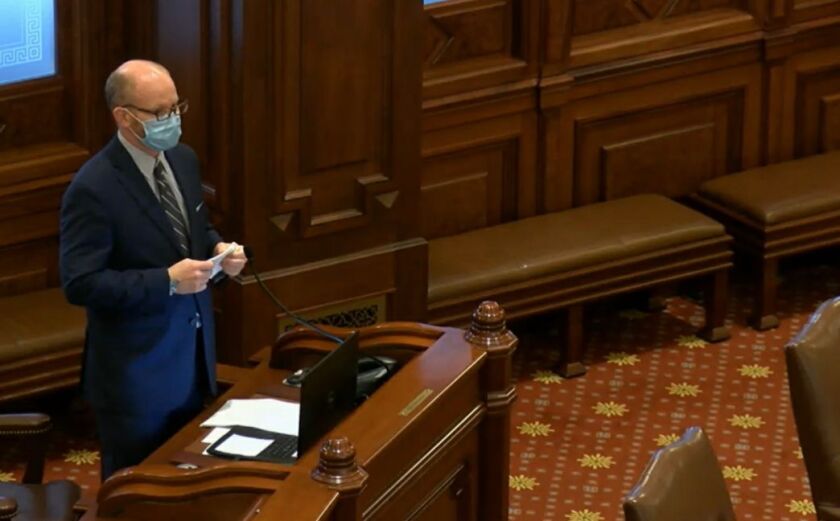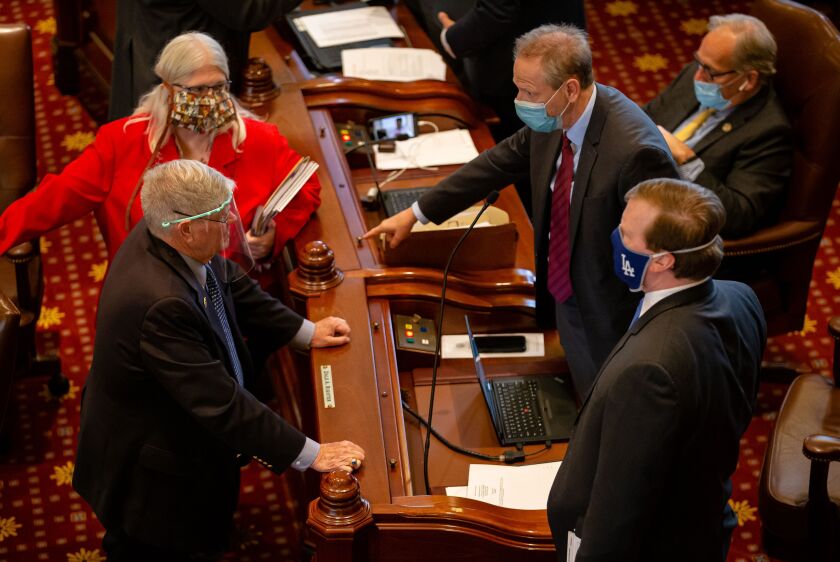SPRINGFIELD — Illinois legislators will return on Saturday for a fourth day of an unprecedented pandemic special session to iron out major legislation — including a full spending plan to get the state through the rest of the year and next and a package of relief efforts to aid Illinois residents and businesses.
But the wheels were rolling on Friday — all day — on several key issues, most importantly the passages of legislation to delay property tax late fees for the majority of the state during the crisis and a measure that allows a ”bridge loan” from the federal government — up to $5 billion — to help fill a revenue gap caused by COVID-19.
Both will head to Gov. J.B. Pritzker’s desk.
And Democratic lawmakers are trying to revive a Chicago casino plan with a reworked tax structure. While amendments were still brewing, the House Executive Committee on Friday night approved the latest version. Chicago would still have the highest tax structure in the state.
Illinois Senate President Don Harmon, D- Oak Park, said the “bridge loan” measure will give the state the ability to borrow “as needed to meet our current obligations.”
“If in fact there were to be a significant federal relief package for states and local government to deal with the economic revenue shortfall, we may not have borrowed anything at that point. We may have borrowed some to navigate cash flow. And we could presumably repay it immediately from the proceeds of that relief package,” Harmon said.
State Sen. Sue Rezin, R-Morris, asked Harmon if Illinois is certain it will receive help from the federal government.
“I do believe that the there will be significant federal relief coming for all states, because all states are in the circumstance,” Harmon said. “And only the federal government can respond appropriately.”
Rezin also expressed disappointment that small businesses and business groups weren’t allowed to provide more input into the efforts to help the state. She called the failure to include them “short term” thinking.
Lawmakers must still pass an appropriations measure, and the budget implementation plan.
Both chambers approved a property tax measure that would renew homestead exemptions without applications in 2020 for people with disabilities, veterans with disabilities or senior citizens who qualify for assessment freezes. It would also waive property tax interest penalties for 120 days for any county with less than three million people, thus excluding Cook County, which already passed its own plan to delay similar fees.
The Senate on Friday also cleared a vote-by-mail expansion measure, shipping it off to Pritzker, who has said he’ll sign it. It will allow for 5 million Illinois voters to automatically be sent mail ballot applications. The temporary expansion of the state’s mail-in balloting program passed the Senate along partisan lines, 37-19.
The measure is paid largely by federal COVID-19 relief funds, but the state must provide 20%, which amounts to $2.78 million.
Democrats supported it, saying they’re worried about a second-wave of the coronavirus suppressing voter turnout for the 2020 election.
During a debate that lasted over an hour on Friday, Republican senators contended the bill would make Illinois’ election more vulnerable to voter fraud. They called the measure unnecessary as the state already has a vote-by-mail system. They argue that anyone who wants a mail-in ballot, can already request one.
Lawmakers also approved a trailer bill that would add security for ballot drop boxes. They must be “secured by locks that may be opened only by the election authority personnel,” according to state Rep. Kelly Burke, D-Evergreen Park, who sponsored the bill in the House.
Republicans, in turn, argued there have been examples of ballot tampering in other states, including thefts of entire boxes.
Also heading to Pritzker’s desk is a workers’ compensation and unemployment package that creates a “rebuttable presumption” that a first-responder or essential worker who contracts COVID-19 did so in the course of their employment. It also extends unemployment benefits by 20 weeks and waives a one-week waiting period so people can receive their compensation immediately upon being laid off. That measure would sunset on Dec. 31.
Legislation that will not be headed to Pritzker is a measure that would have fined businesses that disobey restrictions in the governor’s executive order.It was scrapped because there wasn’t enough support.
Pritzker this week pulled an emergency rule in which business owners would be charged with a misdemeanor should they disobey the order. The legislation he preferred would have fined them. But it was a hard sell for some legislators, who would have had to head back to their districts to face business owners who are already struggling and explain to them why they are also being saddled with fines.
Tina Sfondeles reported from Chicago; Neal Earley reported from Springfield








